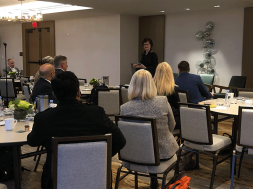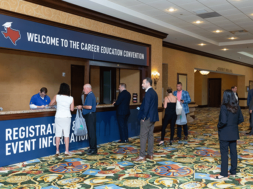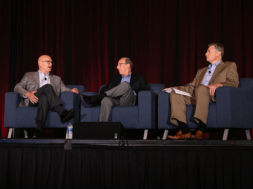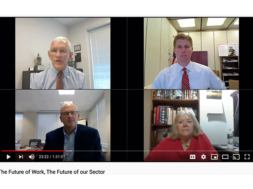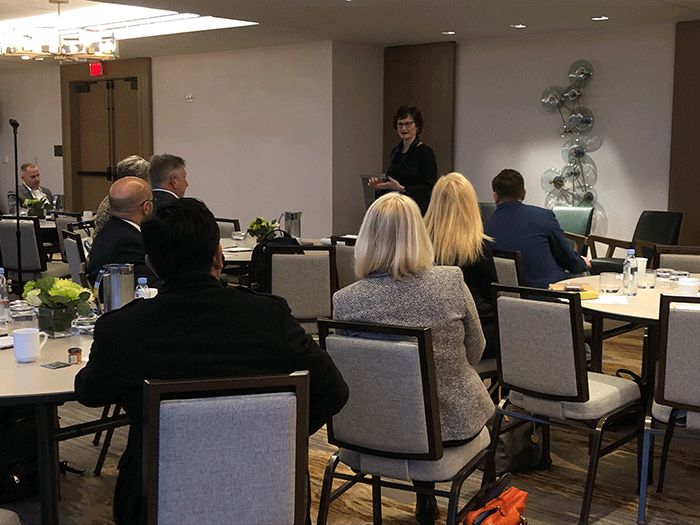
Highlights From CSPEN’s 2019 Higher Education Policy Meeting
By Central States Private Education Network (CSPEN)
In February, CSPEN held a Higher Education Policy meeting in Washington D.C. that included perspectives on higher education policy from:
- A senior Democratic Senator;
- Four top-level staff from the office of all four House and Senate Education Committee leaders offices;
- U.S. Department of Education FSA experts on key areas of compliance important to our community;
- Washington D.C. political and higher education reporters and national social media experts; and
- An expert in Federal Direct Student Loan policy from a national think tank.
Here is a brief summary of the presentations and information gathered from the event.
Monday, Feb. 11, 2019
In the late afternoon, CSPEN Chairman of the Board, Michele Ernst welcomed the group of school owners, directors, and third-party organizations that support our community to our first meeting in Washington, D.C. Michele shared with the participants the continuation of our efforts to respond to the requests of our community, while at the same time remaining true to our four fundamentals – Community, Compliance, Communication, and Innovation.
CSPEN Co-Executive Director Jeri Prochaska then took the opportunity to recognize the considerable number of third-party organizations (aka vendors) who were in attendance and supporting the event along with the institutional representatives. Jeri covered the logistics for the following day’s “jam-packed” agenda and made certain to remind everyone of the receptions with great food and beverages she had arranged for both Monday and Tuesday evenings. (Editorial Note: Nobody throws a party like Jeri!)
CSPEN Co-Executive Director Tom Netting then spent the remaining time providing an up to the minute summary of both the legislative and regulatory landscape, including:
Legislative updates on:
- Recent developments related to the partial government shutdown negotiations;
- The latest details of Senate HELP Committee Lamar Alexander’s new student loan repayment and accountability proposals; and
- Information about the pending House Education and Labor Committee and their plans moving forward.
Regulatory updates on:
- The final preparation taking place before the second sessions of the three 2019 Federal Negotiated Rulemaking Subcommittees;
- An overview of the Full Committee on Accreditation and Innovation’s first meeting and upcoming second meeting; and
- The latest intel on the status of key guidance the community is waiting on several topics (e.g., Borrower Defenses transitional guidance, institutional charges, GE Disclosure Template guidance, et. al.).
At the “Welcome Reception,” those in attendance were joined by several D.C. insiders, including invited guests from Capitol Hill, the Administration, and iHeart Media who was promoting their new D.C. radio station – 104.7 The WONK. A station devoted to D.C. politics. A good time was had by all.
Tuesday, Feb. 12, 2019
“If you are not telling your story, someone else is.” – Opening Keynote Speaker, Senator Joe Manchin (D-WV)
During over a half-hour presentation from Senator Manchin, this quote, and his challenge to our community to redouble our efforts to highlight the positive impact we are having at the state and local level was front and center.

Senator Manchin said that it was time to use the data to show what he already knows, which is that nobody can touch us when it comes to our outcomes – and it is time that we show the differentiation between our community and the success – or lack thereof – of the local community colleges.
The Senator also encouraged our community to focus our efforts and energy on the new members of the Senate – and the House – who are “free thinkers,” who may not have fully formulated their views and opinions yet.
For his part, Senator Manchin committed to continuing to promote the interests of our community and to assist us in our efforts to try and gain greater access to and common ground with Senate Democrats – including entrenched individuals like Senator Richard Durbin.
Senator Manchin shared a story regarding previous discussions with Senator Durbin in which his views were changed following conversations and presentation of information different from his views. He admitted that Senator Durbin was stern, but he said that he is also fair and reiterated his commitment to assisting our community in sharing the positive information with him and others within the Democratic Caucus (e.g., Senator Patty Murray).
House and Senate Education Committee staff – Republican panel discussion
House Education and Labor (E&L) Committee Minority Professional Staffer Alex Ricci, began with a brief summary of what he believes will be the focus of the new Democratically-controlled E&L Committee moving forward. As part of his comments – in true candor – he noted that of the four leaders of the two Education Committees that the House minority probably has the least sway of what will happen in terms of both House E&L Committee hearings and the development of legislative policy – including HEA reauthorization – moving forward. He noted, however, that Ranking Member Virginia Foxx and her staff remain focused and committed to supporting the proposals previously offered in the PROSPER Act. On a positive note, he did say that, thus far, the Committee staff were sharing ideas and that the majority seemed open to compromises on issues of importance to our community.
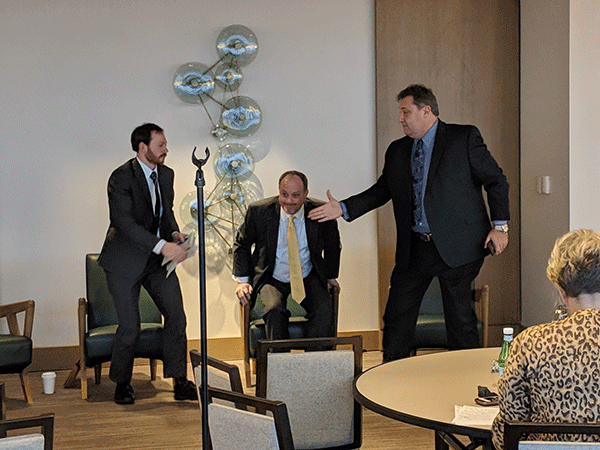
Alex was followed by Robert “Bob” Moran, Senate HELP Committee Education Policy Director, who focused most of his remarks on Chairman Alexander’s comments from the prior week regarding his desire to focus on completion of reauthorization of the HEA by Christmas. Bob highlighted once again three key policy proposals Chairman Alexander seeks to include within the final legislation – FAFSFA Simplification, Loan Repayment Rates, and Accountability. (Note: Senator Alexander’s comments were previously reported by CSPEN and are archived for your review on our website.)
Bob went on to share additional details regarding the proposals, noting that they – along with all of the HEA bills and proposals previously offered and those to come – are still works in progress and that he, on behalf of Chairman Alexander and the Committee, are open to discussion and suggestions regarding the proposals.
Two key takeaways from Bob’s remarks and responses to the Q&A included:
- First, a clear indication that the Chairman and staff are aware of the importance of the inclusion of provisions within the proposed legislation ensuring that institutions receive the same protections as students under the new repayment plans and that institutions be provided the opportunity, with integrity, to limit student borrowing; and
- Second, a clear indication that the Chairman is serious about trying to introduce and mark-up legislation by the spring, have it deliberated on the Senate floor in the summer and move towards deliberations with the House and a final bill by Christmas. Bob shared that he and Ranking Member Murray’s staff have already begun a review of the entire bill and each sides priorities.
Print and social media industry perspectives panel discussion
Michael Stratford, Education Reporter with POLITICO-Pro and Eric Kelderman, Senior Reporter with The Chronicle of Higher Education began by sharing their respective responsibilities and focus.
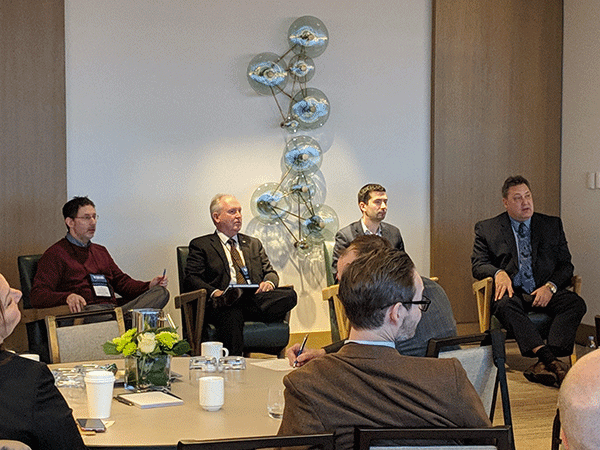
In the discussion of their “beat,” it was clear that these two individuals, not surprisingly look at the issues from entirely different perspectives. Michael from the political side, and Eric from the policy implementation side. But, in terms of access to information, they both said that they prefer to go straight to the source – either on the record or “on-background” – to help them make certain that their reporting is accurate.
Acknowledging that in the moment, reaching out to a party that is alleged to be in trouble, is not opportune, they encouraged our community to be more open to conversations with them – even suggesting that they would willingly sit down with any of the participants the next time they were in town just to learn more about our perspective.
As the discussions of perspective continued, the realization came to light and was openly acknowledged by the reporters, that, as is the case with many sectors of higher education, there are differences within the sector itself. And that these differences are important!
Both reporters said that going forward, they would work to do a better job of noting the distinctions within our community, and once again said that it would be helpful to them if the community would share more insights regarding the differences between publicly-traded institutions and family-owned and other small-business institutions.
Rounding out the panel was Drumm McNauthton, CEO of The Change Leader who brought a unique perspective to the panel as he serves as both a member of social media through his podcasts on high-level higher education policy issues, and also serves as an instructor/advisor for various institutions of higher education.
Drumm did a masterful job not only sharing his own views on how our community needs to improve/enhance the sharing of our successes but also in helping to facilitate how that information can be presented so that it is of interest to reporters like Michael and Eric.
House and Senate Education Committee staff – Democratic panel discussion
Over lunch, Mary Nguyen Barry, Senior Policy Advisor for the Senate HELP Committee’s Minority Office under the leadership of Senator Patty Murray and Katherine Valle, Senior Policy Advisor on Higher Education, with the House Education and Labor Committee’s Majority Office under the leadership of Rep. Bobby Scott joined us for over an hour.
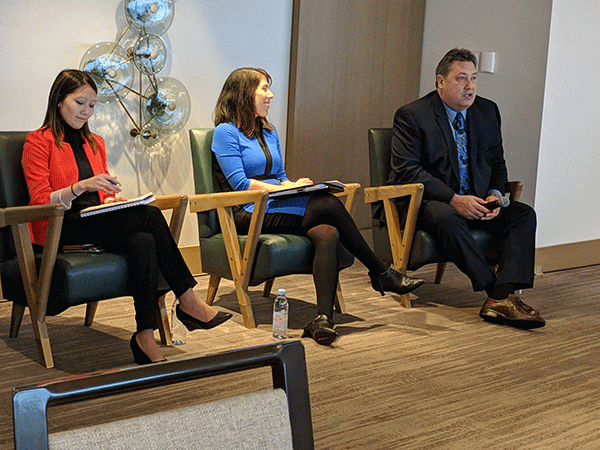
Mary acknowledged the fact that Ranking Member Murray and the staff were already beginning to hold the high-level meetings with Senator Alexander and his staff but was quick to point out that above all else, Senator Murray is only interested in a comprehensive reauthorization, and will not support efforts to pass individual, smaller piece-meal proposals.
Mary explained that Ranking Member Murray and the Senate Democrats have four stated priorities that are at the top of her agenda (e.g., Title IX and Institutional Accountability reforms) and that while the two Senators share many common goals, they are not willing to focus on some, without the inclusion of others.
With respect to several of the issues of greatest importance to our community, Mary said that Senator Murray and Senate Dems are open to suggestions on how to place guardrails up that protect quality institutions within our sector. But, was quick to add that their Committee Members believe that efforts to roll back the GE and BDR regulations are a mistake, as is the decision to re-instate ACICS as a nationally-recognized accrediting agency. She also subtlety noted that these provisions and concerns were narrowly focused and not necessarily issues that should be applied to the entire higher education community – as Chairman Alexander has suggested under his new proposals.
Katherine picked up on these sentiments in her remarks. She stated that while Chairman Scott has a long-standing relationship with schools like ECPI and Tidewater Tech from within our community, there are other Representatives on the E&L Committee who are not supportive of our sector. She noted that just the week prior, at a Community College presentation, Representative Donna Shalala (D-FL) said that she would be introducing legislation that would prohibit all for-profit institutions of higher education from being eligible to participate in the Federal Pell Grant program.
Katherine went on to share comments from Chairman Scott regarding his, and others on the House Majority Members, views that their initial focus will be on hearings to address serious concerns with the Department of Education’s previous actions and the lack of oversight of the Department – thus informing the process and development of their reauthorization proposals.
These hearings are likely to focus on college cost, accountability, and innovation among other topics – as these are key focal points of the previously introduced AIM Higher Act.
Like Mary, Katherine did say that Chairman Scott is looking to the community for proposals that would address reforms within our community and went so far as to suggest topics including the 90/10 rule, GE, and student outcomes.
U.S. Department of Education federal regulatory update
Taking time out from his role as the lead on the entire 2019 Accreditation and Innovation Federal Negotiated Rulemaking and the work within the three Subcommittees, Gregory “Greg” Martin left the negotiations to come and provide a quick update on the status of various regulatory guidance important to the community.
Greg started with an update on the issue relating to institutional charges, acknowledging the lead role that John Paul Mitchell Systems and AACS played in hosting meetings and sending a letter to Secretary DeVos on the issue.
Greg said that a response to the letter and additional guidance would be coming soon and shared what he thought would be the clarifications provided in the additional guidance. Without going into particulars here, which may or may not be final, suffice it to say that it appears good news in on the way!
Greg then noted the publication, that day, of the new 30-day comment period, seeking one last round of comments on the revisions to the GE Disclosure Template before publication of final guidance.
Greg then concluded his remarks with a brief update on the status of the on-going negotiations and his belief that, through these latest negotiations, there will be several favorable revisions to the R2T4 policies, assessment of program length, and many issues related to accreditation.
Unfortunately, Greg was unable to share any new information regarding Borrower Defenses and any interim, transitional guidance that the community is waiting for. He said that he did anticipate that guidance would come “sometime this month or next,” but admitted that he was not responsible for, nor routinely involved in, the development of those regulations.
Greg then turned the conversation over to James “Jim” Moore, the guru of all things related to Campus Safety and Security under the Clery Act and Title IX.
Jim encouraged the community to take some time to focus on compliance with the issues regarding campus safety and the need for our community to do a better job of actually planning for events that – God-forbid – ever happen. But the facts are, they do – and he shared a couple of anecdotes of what happens when institutions don’t actually think the entire process through, test their procedures, and people wind up getting hurt as a result.
His plea, don’t just snag a policy and stamp your name on it. Take just a little bit of time to really look at the policies – on at least an annual basis, run through a test of how your institution would handle an active shooter situation or other circumstances where the entire institution – students, faculty, and staff would need to exit the building, and the policies related to how to handle issue of domestic violence, abuse, and bullying.
Think tank takes on the future on higher education policy
Closing out the day was a former CSPEN presenter, Jason Delisle, Resident Fellow in Education Policy Studies with the American Enterprise Institute.
Jason shared his research on both the Federal Direct Student Loan program and Federal Pell Grant program, issues and concerns with the way the current system is ineffective, and revisions that he thought might be able to address concerns with student debt, institutional costs, and loan repayment.
Several key takeaways included his belief that graduate student loans should not be part of the system, loan repayment is important to track – but should include borrower accountability, institutional accountability is also important – but must be realistic and equally applied to all programs and all types of institutions of higher education, and that grant assistance need to be more targeted.
Higher education policy reception
A long day concluded with a packed room of participants sharing what they had heard throughout the course of the day and preparing to take that information to Capitol Hill the following day.
Wednesday, Feb. 13, 2019
Armed with the most recent perspectives and information available, the institutional representatives took time on their own to call upon their elected officials in support of the issues most important to them. Early reports from those meetings indicate that the timing for the conversations was perfect and that a great deal of information was shared – with more to follow as the institutions are encouraged by CSPEN to follow up and follow-through.
Save the Date
CSPEN is holding their 5th Annual Conference August 20 – 23 at the Intercontinental Chicago Miracle Mile in the heart of downtown Chicago. You won’t want to miss the opportunity to hear from topic experts, network with fellow school representatives, and explore products and services that can help make your school, students and community benefit from even greater success. For more information visit centralstatesedu.com.
